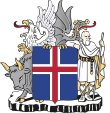|
2012 Icelandic presidential election
Presidential elections were held in Iceland on 30 June 2012.[1] The result was a victory for the incumbent Ólafur Ragnar Grímsson, who defeated his nearest rival Thóra Arnórsdóttir by nearly 20% of the vote, and went on to serve a record fifth term as president of Iceland. Electoral systemThe President of Iceland is elected in one round by first-past-the-post voting. Candidates and campaignThere were six candidates, but the election became a contest between the incumbent president, and the journalist Thóra Arnórsdóttir, who wanted to return the presidency to a more ceremonial role. Main candidates:
Others:
Two other candidates declared their intent to stand in the election, but later dropped out:[11]
CampaignAfter trailing in the opinion polls, Ólafur resorted to a negative campaign against Thóra, saying she would be "dangerous for the country" and that she would "do nothing but follow the government's will, particularly in terms of foreign policy", in continuing its membership application to the European Union being pursued by the current government led by Jóhanna Sigurðardóttir's Social Democratic Alliance, and he had reservations about the prospect of being a member of the EU. He also accused the Icelandic media of giving Thóra preferential treatment.[12] Ólafur also claimed to be the best person to steer Iceland through financial crisis.[6] Thóra also accused Ólafur of distorting the president's role from that of a figurehead to a more political position[11] and that she would return the post to its ceremonial stature instead of getting involved in politics.[14] However, Ólafur was said to be popular because of the two referendums Iceland held over the financial crisis and, as a result, many Icelanders felt he was looking out for their interests[15] after being seen to have stood up to the United Kingdom and the Netherlands over Icesave repayments.[16] Thóra told the Reykjavik Grapevine that Iceland needs new leadership: "I think we have all felt a strong need for a change in this country. Iceland is a small country, and we pretty much agree on how this society should be;" she also told Morgunbladid that her lack of experience in politics was not a bad thing as she "think[s] that now is an opportunity to learn from the experience we have been through … and use it for a new beginning...[although the presidency is largely ceremonial, the position] has a great power of influence."[17] Opinion pollsAn opinion poll published on 21 May by the Institute of Social Sciences at the University of Iceland showed Thóra leading with 46.2%, with Ólafur on 37.8%. However, after she suspended her campaign as she was due to give birth, the gap narrowed as Ólafur stood alone as the leading campaigner.[12] An average of three poll prior to the election indicated Ólafur leading with 45% and Thóra in second place with 37.7% ahead of four other candidates.[6]
ConductVoting centres were open from 9AM to 10PM. After having voted, Thóra said to DV: "You see this glorious day, I can't be anything but optimistic. The Gallup poll gives a strong indication of the outcome, but we will just count the votes and accept whatever that brings us. To have the possibility to topple the current president is a victory in itself." The same day Ólafur wrote in Morgunbladid: "Iceland is now at a crossroads. Behind us are difficult years. Ahead are decisions on the constitution and our relationship with other countries in Europe. There is still turbulence in the continent's economy and in many areas... The president...shall assist the country in tackling the biggest issues; they will determine the fate of Icelanders for decades."[14] Results
ReactionsAfter partial results were released Thóra told RUV: "This has been a valuable experience. Now I will take a holiday, attend to my new daughter and the other children and go on maternity leave and think how I can put this experience to use. To get more than one-third [of votes], I'm overwhelmed. I of course hoped to win. This is something you only do once in a lifetime," as she indicated she would not run in the next election.[26] AnalysisAccording to Euronews, Ólafur's win was seen as having "emboldened a presidential office that had up until then played a mainly ceremonial role."[27] If one of the female candidates had won, Iceland would have had nearly all its leading governing and religious positions held by women; the female president would be head of state, Jóhanna Sigurðardóttir would be head of government, Ásta Ragnheiður Jóhannesdóttir would be the Althing speaker, while Agnes M. Sigurðardóttir would have been the head of the Church of Iceland.[12] Further reading
References
External links
|
||||||||||||||||||||||||||||||||||||||||||||||||||||||||||||||||||||||||||||||||||||||||||||||||||||||||||||||||||||||||||||||||||||||||||||||||||||||||||||||||||||||||||||||



